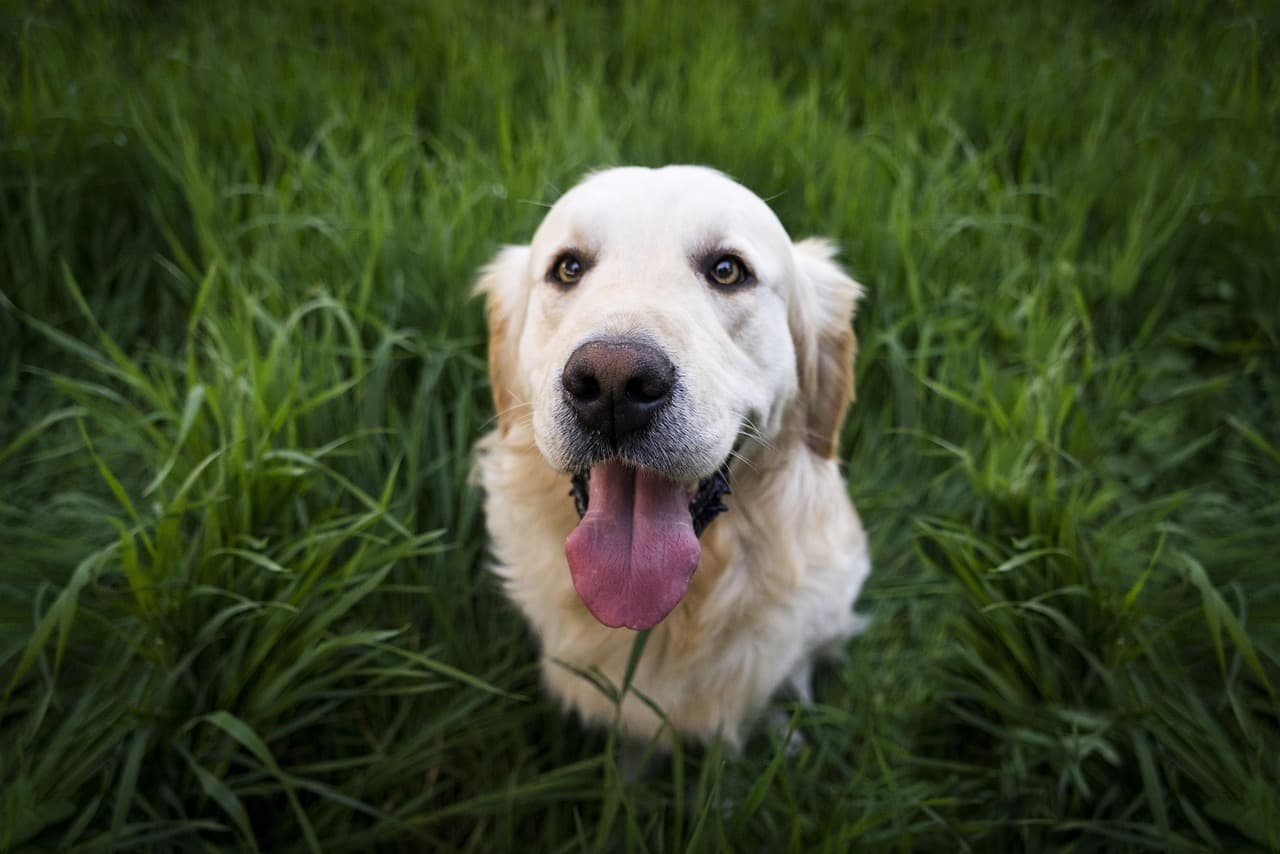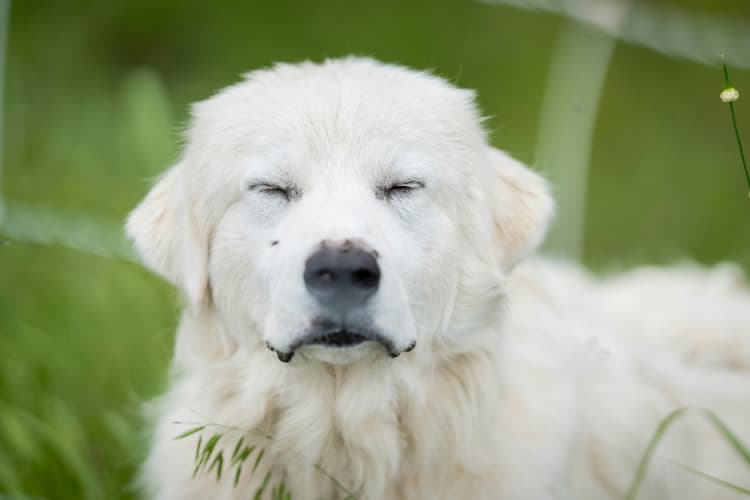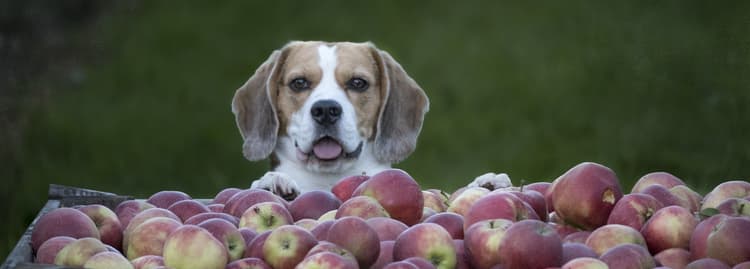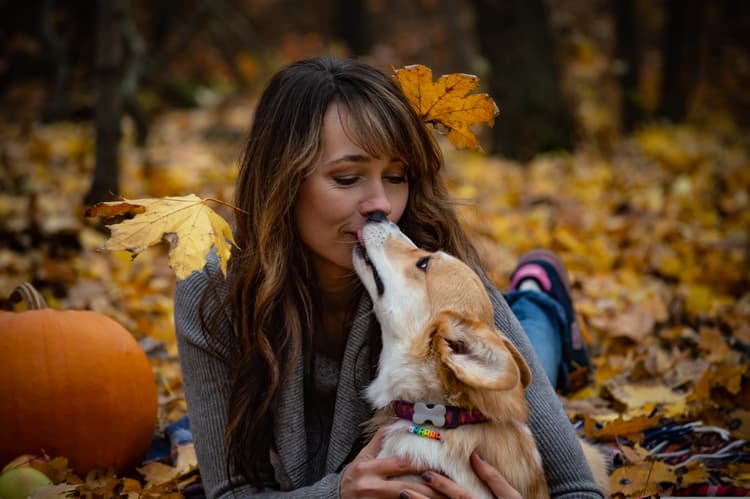Why Do Dogs Eat Grass?
If you are wondering, “Why is my dog suddenly eating grass like crazy?” don’t worry—this is a common and usually harmless behavior in dogs. Many dogs eat grass, and while some gently nibble on tender blades, others may chomp it down as frantically as a hungry cow!
In most cases, grass eating isn’t a cause for concern. In fact, some veterinarians believe that grass can be beneficial for dogs, providing roughage and aiding digestion. However, if your dog suddenly begins eating grass excessively or obsessively, it could be a sign of an underlying issue—ranging from nutritional deficiencies to stress or behavioral problems.
Dog Aggressively Eating Grass vs. Occasional Nibbling
Feature/type | Occasional Nibbling | Aggressive |
Intensity of behavior | Slow and calm grazing | Frantic, rapid chewing and swallowing |
Body language | Relaxed, curious | Tense, urgent, possibly distressed |
Frequency | Infrequent, seasonal, occasional | Frequent, sudden onset |
Possible cause or reason | Normal instinct, minor constipation, or curiosity | Underlying health issues or behavioral problems |
Cause for concern | Usually not concerning | May require veterinary attention if behavior persists |
9 Common Reasons Behind Dogs Aggressively Eating Grass
There’s no one-size-fits-all explanation for grass-eating behavior in dogs. A variety of physical and behavioral triggers can lead to sudden or frantic grass consumption. Below are some of the most common reasons:
1. Stomach Discomfort or Nausea
This is one of the most common reasons for a dog eating grass frantically. It’s often seen in pets with acid reflux, recent dietary changes, or gastrointestinal upsets. Dogs who go hungry for extended periods may eat grass to relieve nausea or hunger pangs. Some may even use it as a way to induce vomiting and clear out their stomachs.
Additionally, grass can help dogs who are lacking fiber in their diets. In fact, one study reported that a miniature Poodle that vomited daily after eating grass stopped the behavior entirely after switching to a high-fiber diet.
2. Boredom, Anxiety, or Attention-Seeking
Some dogs resort to eating grass when they’re bored, anxious, or trying to get their owner’s attention. Bored or stressed dogs may develop pica, a behavioral condition where they consume non-food items like grass, toilet paper, or fabrics.
Dogs left alone in the yard for long periods often develop repetitive or compulsive behaviors such as grass eating, excessive licking, or self-chewing. If left unaddressed, these behaviors can become ingrained and harder to manage.
To prevent this, ensure your dog receives plenty of daily exercise, mental stimulation, and interaction.
3. Exploration and Curiosity
Curiosity or exploration is one of the common answers to, “Why is my dog eating grass all of a sudden?” Young dogs—especially puppies—explore the world through their mouths, and the texture, smell, or taste of grass can be particularly tempting.
Teething puppies may chew on grass (and just about anything else) to soothe inflamed gums. Dogs introduced to a new environment or routine may also eat grass simply as part of exploring unfamiliar surroundings.
4. Because They Like the Taste
Some dogs simply enjoy the taste of grass—especially the fresh, tender shoots that sprout after rain or in the early morning dew. These young blades can be appealing due to their moisture content and crisp texture, almost like a refreshing salad. While this isn't the most common reason why you may find your dog obsessively eating grass, it can be a contributing factor, particularly in dogs that enjoy sensory exploration.
5. Imitating Other Dogs
Dogs are social animals and often mimic the behavior of others—especially younger dogs observing their mothers, siblings, or packmates. If your dog has seen another dog eating grass, they might copy the behavior out of habit or curiosity. While this might start innocently, repeated mimicry can turn into a compulsive routine. Keep an eye on your pet if you suspect social imitation is a factor.
6. Nutritional Deficiencies
Sometimes, a dog furiously eating grass could be triggered by some nutritional deficiencies or something lacking in the dog’s diet. Dogs fed low-quality or unbalanced diets—especially those lacking adequate fiber, moisture, or essential micronutrients—may instinctively seek grass to meet those missing needs.
Grass may help regulate bowel movements and prevent constipation by aiding digestion. A lack of vitamins, minerals, or digestive support may also prompt dogs to consume grass regularly.
If you find your dog excessively eating grass, consult your vet to evaluate their diet. Watch for additional signs of nutritional imbalance, such as a dull coat, hair loss, abnormal stools, or persistent hunger between meals.

7. Hunger or Meal Timing Issues
Some dogs eat grass when they’re hungry—particularly if they’re fed inconsistently or have long gaps between meals. If your dog tends to eat grass just before feeding times, they may be trying to curb their hunger or stimulate digestion. Maintaining a consistent and appropriate meal schedule may help reduce this behavior.
8. Medical Conditions
Certain medical issues can also trigger grass eating. Hormonal imbalances such as hypothyroidism, or conditions like pancreatitis, diabetes, or inflammatory bowel disease (IBD), may lead to gastrointestinal discomfort or irregular digestion, which dogs may try to soothe by eating grass.
Keep an eye out for warning signs such as changes in appetite (either excessive or reduced), lethargy, unusual stool consistency, or vomiting. If these symptoms accompany grass-eating behavior, consult your vet promptly.
9. Parasites
Intestinal parasites—such as roundworms, tapeworms, hookworms, or whipworms—can irritate the digestive tract, causing discomfort that might drive a dog to eat grass in an attempt to ease symptoms or expel the parasites.
This is why it’s essential to follow a routine deworming schedule as advised by your veterinarian. Regular stool checks can also help catch parasite issues early.
Why Is My Dog Eating Grass and Throwing Up?
Many dog owners mistakenly believe that dogs eat grass specifically to make themselves vomit when they feel unwell. While this can sometimes be true, it's not always the case—and not every dog that eats grass is sick.
In fact, studies show that only about 25% of dogs that eat grass end up vomiting, and of those, just 10% showed any signs of illness beforehand. This suggests that grass-eating is often unrelated to nausea and may instead be driven by simple curiosity, boredom, or even enjoyment of the taste.
Bottom line: Not all dogs who eat grass will vomit afterward. In many cases, the grass simply passes through the digestive system and appears in the stool.
Even if your dog does vomit after eating grass, it’s not necessarily a cause for concern. If it happens occasionally and your dog otherwise seems healthy, you usually don’t need to worry. However, persistent vomiting, especially when accompanied by diarrhea, lethargy, or loss of appetite, warrants a visit to the veterinarian to rule out any underlying health issues.
Dog Eating Grass Frantically in the Middle of the Night
If your dog is frantically eating grass during the night, they may be experiencing hunger or a sudden buildup of stomach acid. Signs of acid reflux in dogs can include excessive lip licking, gulping, restlessness, pacing, or begging for food even after a recent meal.
If this behavior occurs frequently, consider adjusting your dog’s feeding schedule. Offering two or three smaller meals spaced throughout the day—instead of one or two large meals—can help regulate digestion and prevent nighttime discomfort.
How to Stop a Dog from Eating Grass Obsessively
First and foremost, most veterinarians agree that mild or occasional grass eating is usually not a cause for concern. However, if your dog is obsessively eating grass or waking you up in the middle of the night to eat grass and vomit, it’s important to seek medical evaluation and intervention.
Mental Enrichment and Physical Activity
Keeping your dog mentally and physically stimulated is key. A well-exercised dog is less likely to develop grass-eating as a coping mechanism. Increase daily walks, off-leash play (in safe environments), and agility exercises.
If your dog spends a lot of time alone, keep them entertained with toys, puzzles, and obstacle courses. When you’re home, engage them in scent-driven games or interactive play to reduce boredom and anxiety.
Optimize Feeding Habits and Nutrition
Add more fiber or roughage to their diet.
Many dogs eat grass because they need more fiber or roughage. Consult your vet to adjust your dog’s diet appropriately. You can mix in high-fiber vegetables such as pureed pumpkin or cooked green beans to see if it helps reduce grass-eating behavior.
Adjust their feeding schedules.
If acid reflux or nighttime hunger is triggering your dog’s grass eating, try feeding two or three smaller meals throughout the day, or feed a later evening meal to curb early morning grass cravings.
Add a probiotic supplement.
Ask your veterinarian about probiotic supplements to support your dog’s gut health. Probiotics promote beneficial intestinal bacteria and can improve overall digestion.
Training Strategies to Break the Habit
Train your pet in basic obedience.
Training your dog in basic obedience—especially commands like “drop it” and “come”—can help prevent them from eating unwanted objects or non-food items such as grass. Always reward and praise your dog when they obey to reinforce positive behavior.
Use distractions and positive associations.
During walks or outdoor time, carry toys or high-value treats to divert your dog’s attention away from grass or other tempting distractions. Redirecting their focus early can help reduce grass-eating tendencies.
Observe your pet in new environments.
Be especially watchful when your dog is exploring new places or highly stimulating environments. If they begin eating grass, gently and promptly redirect their attention. Early intervention is crucial to prevent the behavior from becoming obsessive.
Safe Alternatives and Preventive Actions
Offer chewable substitutes.
Providing textured chew toys or tasty snack alternatives can help satisfy your dog’s curiosity about texture and taste, reducing their urge to eat grass. These safe options can prevent grass eating from becoming a difficult habit to break.
Ensure the grass is safe for your dog to eat.
If your dog eats grass occasionally for fiber, make sure the grass is safe and non-toxic. Avoid allowing your dog on lawns treated with pesticides or herbicides. Also, check the area for bugs, worms, or animal feces to prevent any health risks.
Deworm your pet regularly.
Work with your veterinarian to establish a routine deworming schedule. Parasites like hookworms and pinworms can irritate your dog’s intestines and may trigger grass eating. Regular fecal exams and monitoring of your dog’s stools help ensure they stay parasite-free.
When Should You See a Veterinarian?
Occasional grass eating is generally harmless. In fact, fresh, clean grass can provide fiber, roughage, and some micronutrients that may benefit your dog’s digestion. However, excessive or obsessive grass eating could signal an underlying health issue that requires veterinary attention.
Consult your vet if your dog:
Vomits frequently after eating large amounts of grass
Experiences severe diarrhea or constipation
Appears lethargic, restless, whines constantly, or shows signs of abdominal pain
Refuses to eat or has lost a significant amount of weight
Your veterinarian may recommend diagnostic tests such as:
A complete medical history review
Fecal examination
Abdominal ultrasound or X-rays
Blood tests to check for conditions like thyroid disorders, diabetes, pancreatitis, or gastrointestinal inflammation
Early diagnosis and treatment can help keep your dog healthy and comfortable.
Conclusion
If you find your dog suddenly eating grass like crazy, try not to worry—most often, they may simply be seeking extra fiber in their diet. However, if the behavior becomes frequent, excessive, or obsessive, especially alongside other signs of health or behavioral issues, it’s important to consult your veterinarian. We hope this guide helps you better understand, manage, and reduce your dog’s grass-eating habits.
Frequently Asked Questions
What are the consequences of a dog eating too much grass? How can you tell if a dog is eating too much grass?
Eating excessive grass can cause an upset stomach or indigestion. Many dogs vomit or have a bowel movement after consuming large amounts of grass. If your dog is obsessively eating grass, appears lethargic, and refuses their regular food, it could indicate they are eating too much and may need veterinary attention.
My dog isn't eating his food, but he is eating grass. What does it mean?
If your dog refuses their regular food but eats grass, it may be a sign they are seeking extra fiber, feeling upset or bored, or trying to get your attention. It’s important to monitor their overall behavior and consult a vet if the behavior persists.
Why does your dog eat petals, leaves, or grass? Is it harmful for them if they don't throw up after eating it?
Dogs may eat petals, leaves, and grass to compensate for nutritional deficiencies or to induce vomiting. However, some plants can be toxic or cause intestinal blockages if consumed in large amounts. If your dog is eating these items regularly, it’s best to consult your veterinarian to ensure their safety.








